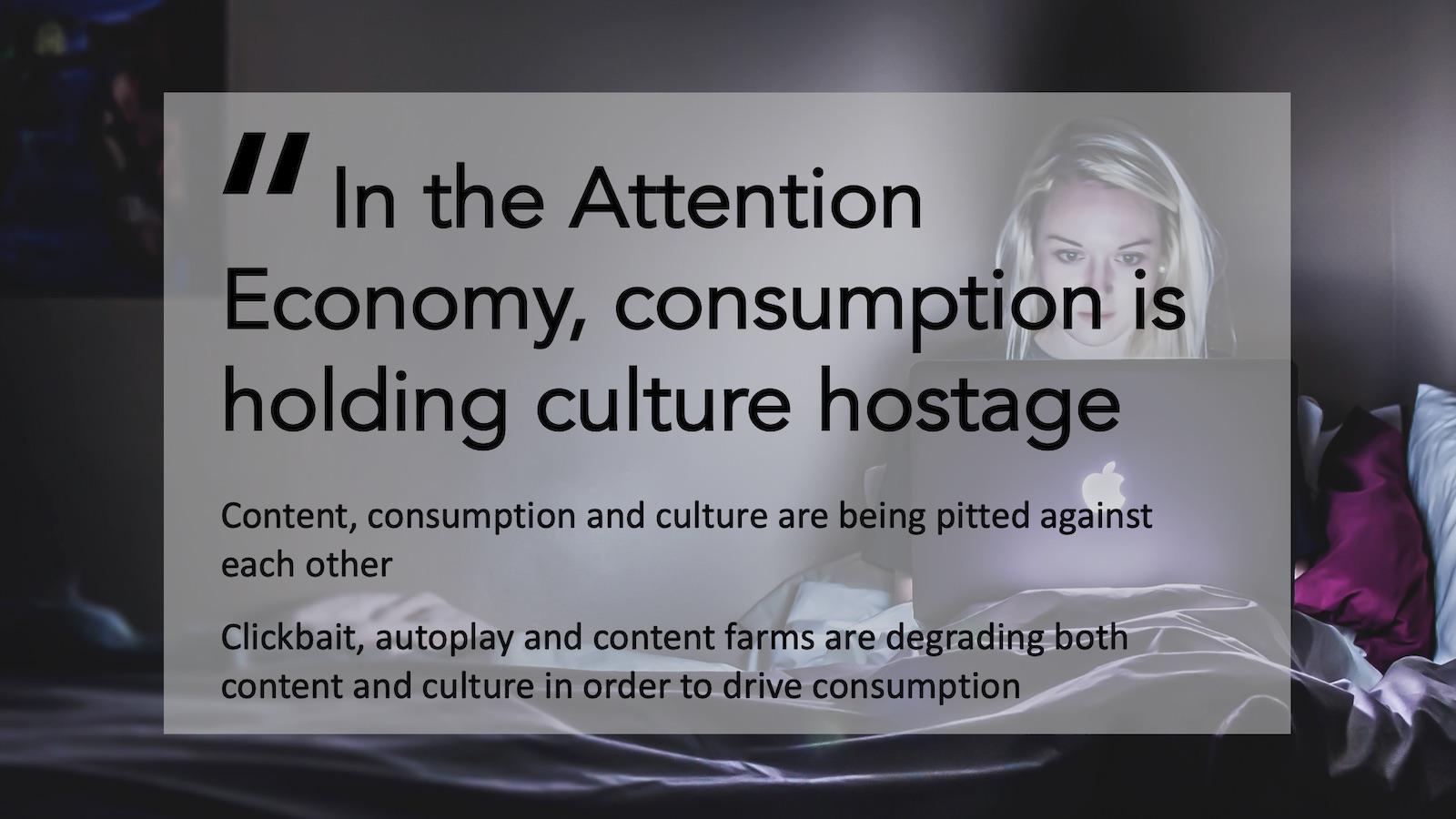Music has developed an attention dependency


The attention economy defines and shapes today’s digital world. However, we have long since reached peak in the attention economy with all available free time now addressed. What this means is that previously, when digital entertainment propositions grew, they were often using up users’ free time. Now though, every minute gained is at someone else’s expense. The battle for attention is now both fierce and intense. What is more, it will get worse when much of the population finally returns to commuting and going out, as 2020 was defined by entertainment filling the extra 15% of free time people found in their weekly lives. But there is an ever bigger dynamic at play, one which gets to the very heart of entertainment: the attention economy is becoming a malign force for culture. Consumption is holding culture hostage.
The increasingly fierce competition for consumers’ attention is becoming corrosive, with clickbait, autoplay and content farms degrading both content and culture. What matters is acquiring audience and their time, the type of content and tactics that captures them is secondary. It is not just bottom feeder content farms that play this game, instead the wider digital entertainment landscape has allowed itself to become infected by their strategic worldview.
The attention dependency goes way beyond media
Do not for a minute think this is a media-only problem. The corrosive impact of the attention economy can be seen right across digital entertainment, from hastily churned out scripted dramas, through to music. Artists and labels are locked in a race to increase the volume and velocity of music they put out, spurred on by Spotify’s Daniel Ek clarion call to up the ante even further. In this volume and velocity game, algorithm-friendly A&R and playlist hits win out. Clickbait music comes out on top. And because music attention spans are shortening, no sooner has the listener’s attention been grabbed, then it is lost again due to the next new track. In the attention economy’s volume and velocity game, the streaming platform is a hungry beast that is perpetually hungry. Each new song is just another bit of calorific input to sate its appetite.
In this world, ‘streamability’ trumps musicality, but it is not just culture that suffers. Cutting through the clutter of 50,000 new songs every day also delivers diminishing returns for marketing spend. Labels have to spend more to get weaker results.
Featured Report
MIDiA Research 2026 predictions Change is the constant
Welcome to the 11th edition of MIDiA’s annual predictions report. The world has changed a lot since our inaugural 2016 edition. The core predictions in that report (video will eat the world, messaging apps will accelerate) are now foundational layers of today’s digital economy.
Find out more…Music subscriptions accentuate the worst parts of the attention economy
Perhaps most importantly of all though, music subscriptions are the worst possible ecosystem in which to monetise the attention economy. In online media, more clicks means more ads, which means more ad revenue. In music subscriptions it is a fight to the death for a slice of a finite royalty pot. A royalty pot that is also impacted by slowing streaming growth and declining ARPU. The music industry has developed an attention dependency in the least healthy environment possible.
This is not one of those market dynamics that will eventually find a natural course correction. Instead, the music industry has to decide it wants to break its attention dependency and start doing things differently. Until then, consumption and content will continue to push culture to the side lines.
It is time to take hold of the wheel
Some years ago, Andrew Llyod Webber said this: “The fine wines of France are not merely content for the glass manufacturing business”. Although those words are of someone from the old world grappling with the new, the underlying premise remains. None of this is to suggest that streaming consumption is not the future. Nor is it to even suggest that all of the changes to the culture of music that streaming has brought about are negative. In fact, it may be that streaming-era music culture is simply what the future of music is going to be. But what is crucial is that artists, labels, songwriters and publishers take an active role in steering the ship to the future rather than simply getting pulled along by the streaming tide.

There are comments on this post join the discussion.